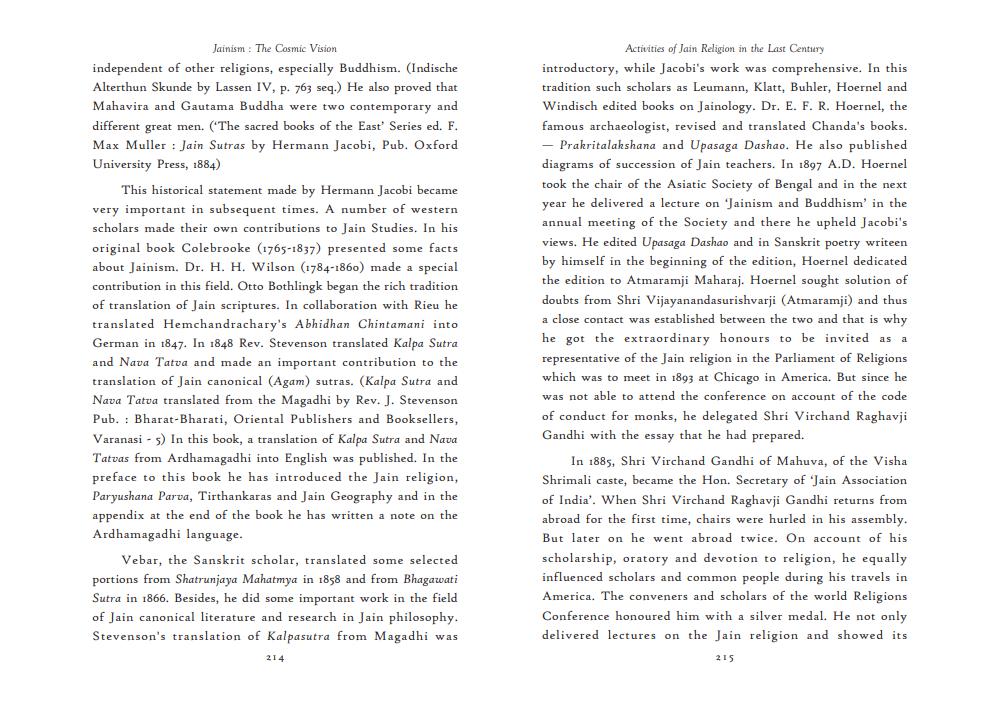________________
Jainism: The Cosmic Vision
independent of other religions, especially Buddhism. (Indische Alterthun Skunde by Lassen IV, p. 763 seq.) He also proved that Mahavira and Gautama Buddha were two contemporary and different great men. ('The sacred books of the East' Series ed. F. Max Muller: Jain Sutras by Hermann Jacobi, Pub. Oxford University Press, 1884)
This historical statement made by Hermann Jacobi became very important in subsequent times. A number of western scholars made their own contributions to Jain Studies. In his original book Colebrooke (1765-1837) presented some facts about Jainism. Dr. H. H. Wilson (1784-1860) made a special contribution in this field. Otto Bothlingk began the rich tradition of translation of Jain scriptures. In collaboration with Rieu he translated Hemchandrachary's Abhidhan Chintamani into German in 1847. In 1848 Rev. Stevenson translated Kalpa Sutra and Nava Tatva and made an important contribution to the translation of Jain canonical (Agam) sutras. (Kalpa Sutra and Nava Tatva translated from the Magadhi by Rev. J. Stevenson Pub. Bharat-Bharati, Oriental Publishers and Booksellers, Varanasi - 5) In this book, a translation of Kalpa Sutra and Nava Tatvas from Ardhamagadhi into English was published. In the preface to this book he has introduced the Jain religion, Paryushana Parva, Tirthankaras and Jain Geography and in the appendix at the end of the book he has written a note on the Ardhamagadhi language.
Vebar, the Sanskrit scholar, translated some selected portions from Shatrunjaya Mahatmya in 1858 and from Bhagawati Sutra in 1866. Besides, he did some important work in the field of Jain canonical literature and research in Jain philosophy. Stevenson's translation of Kalpasutra from Magadhi was
214
Activities of Jain Religion in the Last Century introductory, while Jacobi's work was comprehensive. In this tradition such scholars as Leumann, Klatt, Buhler, Hoernel and Windisch edited books on Jainology. Dr. E. F. R. Hoernel, the famous archaeologist, revised and translated Chanda's books. - Prakritalakshana and Upasaga Dashao. He also published diagrams of succession of Jain teachers. In 1897 A.D. Hoernel took the chair of the Asiatic Society of Bengal and in the next year he delivered a lecture on Jainism and Buddhism' in the annual meeting of the Society and there he upheld Jacobi's views. He edited Upasaga Dashao and in Sanskrit poetry writeen by himself in the beginning of the edition, Hoernel dedicated the edition to Atmaramji Maharaj. Hoernel sought solution of doubts from Shri Vijayanandasurishvarji (Atmaramji) and thus a close contact was established between the two and that is why he got the extraordinary honours to be invited as a representative of the Jain religion in the Parliament of Religions which was to meet in 1893 at Chicago in America. But since he was not able to attend the conference on account of the code of conduct for monks, he delegated Shri Virchand Raghavji Gandhi with the essay that he had prepared.
In 1885, Shri Virchand Gandhi of Mahuva, of the Visha Shrimali caste, became the Hon. Secretary of 'Jain Association of India'. When Shri Virchand Raghavji Gandhi returns from abroad for the first time, chairs were hurled in his assembly. But later on he went abroad twice. On account of his scholarship, oratory and devotion to religion, he equally influenced scholars and common people during his travels in America. The conveners and scholars of the world Religions Conference honoured him with a silver medal. He not only delivered lectures on the Jain religion and showed its
215




